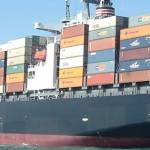Dimitri Kosmas had been working in his family's law firm in Panama for several years when he decided he needed an LL.M. He discusses the law school experience, New Orleans, and why he chose Tulane's Maritime Law program.
What's your background, and what led you to an LL.M in Maritime Law?
I was born and raised in Panama City. I went to law school at the Universidad de Panamá in Panama City. After I got my law degree, I went to Salamanca, Spain, to the Universidad de Salamanca, to do my post-graduate degree in contracts and damages. After a couple of years of working in our family-owned law firm, I decided to apply for an LL.M. And when I was doing research to apply for an LL.M. I asked myself, what does Panama need?
And in Panama we have the Panama Canal, and there is a lot of work to do in Panama in the maritime sector. So I decided, 'you know what, let's go for it.'
Why Tulane in particular?
I was checking the rankings regarding the maritime programs, and Tulane, at the moment that I applied, was ranked really highly.
And I saw that both the University of Southampton and Swansea both have maritime programs as well, but when I saw the maritime program at Tulane, it was really interesting, and it was closer to my country, so it was a shorter trip if I wanted to come back to visit.
How did you find New Orleans?
New Orleans is a city that you either love or hate. For me, it's a fantastic city. It reminds me a lot of Panama City, because of the people – they are really outgoing people, you can talk to them. There is this vibe in the city, it's the perfect balance between study and social life, and also the culture.
But if you are mature, and you know your responsibilities, there's nothing in the city that can distract you. If you have time, of course, you can party, go to Bourbon Street, or enjoy Mardi Gras, but if you really make an effort to divide your time, you will enjoy every minute of your ten months there.
Before I went, people were telling me, 'oh, New Orleans is really dangerous, you have to take care.' But in every major city there is danger. You just have to take care of yourself, be in groups, and know where you're going, and you will not have any problems. And wherever you go, there are people willing to help you.
I actually stayed in New Orleans for two more weeks after graduation, because I didn't want to leave.
How was the experience challenging?
In the US, they work in the common law system, and in Panama we work in the civil law system, and adapting my system to their system and understanding how the judicial system works – that was really a challenge, not only for me, but for all my other international classmates.
And there were a lot of lectures, and a lot of assignments. But if you divide your time, you can do the assignments and enjoy your ten months in New Orleans. You just have to divide your time well. There were some classes where they assign 100 or 200 pages of reading per class, and since my native language is not English, it was a challenge.
You graduated in May. How do you think the LL.M. will help your career?
In Panama, if you don't have an LL.M., it can be difficult to get a good job. So if you get an LL.M., you are highly ranked among lawyers in Panama. And especially in the maritime department, if you have a Maritime LL.M., I would say that it ranks you even higher. And for me, everything that I learned throughout the year – because every day you learned something new there – has changed me. And I'm really satisfied that I made the decision.
Right now I am starting to work in the maritime department of the law firm. Before I went to Tulane, I was doing mostly corporate and administrative law, but after finishing at Tulane, I have become passionate about maritime law. If you talk to me about maritime law, I'm all ears. And I'm working more every day to learn.








